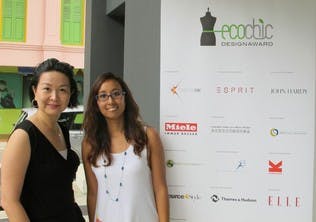Hong Kong based non-profit Redress on Wednesday launched its flagship EcoChic Design Award in Singapore, a competition for designers that encourages sustainable fashion which reduces textile waste.
To continue reading, subscribe to Eco‑Business.
There's something for everyone. We offer a range of subscription plans.
- Access our stories and receive our Insights Weekly newsletter with the free EB Member plan.
- Unlock unlimited access to our content and archive with EB Circle.
- Publish your content with EB Premium.
Young fashion designers are invited to submit their ideas for the competition over a nine-month period, after which winners will design a recycled textile clothing collection for global retail brands such as Esprit, among other prizes.
Founder and chief executive of Redress, Christina Dean, noted at the launch held at local art gallery and café Artistry that there was a huge potential for reducing waste in the fashion industry - one of the world’s most polluting and resource-intensive sectors.
“Sustainability in the fashion industry is an over-discussed but under-actioned issue. Not enough focus is being put on reducing waste. We must crack the industry’s problem of excessive waste production and lost economic value,” said Ms Dean.
She noted that the global textiles market grew by 2.6 per cent in 2010 to reach US$1.2 trillion, and this is set to increase to US$1.5 trillion by 2015. The Asia Pacific region accounts for almost 60 per cent of this market.
About 15 per cent of all textiles meant for clothing end up on the cutting room floor, and globally, 8 billion garments are produced from natural resources each year, while 7.5 billion clothing items go to the landfill.
What consumers do not realise is the amount of resources that go into each item of clothing, said Ms Dean. One pair of jeans, for example, uses 3,625 litres of water and 116 days of electricity required to power a lightbulb.
“When you reduce waste, you kill many birds with one stone. And it is also a smart business move,” she added.
The good news, she said, is designers are able to influence not just the way materials are used in the supply chain, but they are also able to influence the consumer.
“They are agents of change, that’s why we designed this competition.”
The competition requires designers to use textile waste in their competition outfits, and employ design techniques such as zero-waste, up-cycling and reconstruction, which eliminates waste at the design stage, recycles a material into a product of higher quality and make new clothes from previously worn garments.
Redress will support applicants throughout the competition with educational online materials, articles, workshops and seminars.
Now in its fourth cycle, the awards - initially launched in 2011 - are entering the Singapore market for the first time, along with Taiwan, United Kingdom, France, Belgium and Germany. It was held in Hong Kong and China in the previous years, and attracted 100 to 150 applicants each time.
But the number of competitors do not define the success of the award, stressed Ms Dean, who said the ultimate objective was to raise awareness among all budding designers about the concept of sustainable fashion. Previous winners of the EcoChic Award have gone on to launch successful sustainable fashion labels, she added.
“
Fashion designers are able to influence not just the way materials are used in the supply chain, but also the consumer. They are agents of change, that’s why we designed this competition.”
Christina Dean
Ms Dean said the decision to involve European cities was because even though the sustainable fashion movement is more mature there, there is a disconnect between designers and the waste the sector generates, given that most of the manufacturing is located in Asia.
Local judges ST Ang, Country Manager Singapore and Malaysia, Esprit, Sharon Lim, Editor in Chief, ELLE Singapore, and Yumiko Uno, Co-Founder and Fashion Designer, Etrican, will select three semi-finalists from Singapore, who will go on to compete with their counterparts from other countries. The eight finalists will eventually go on to Hong Kong for a two-day seminar and present their sustainable collections at Hong Kong Fashion Week in January next year.
Ms Uno said that when Etrican first launched its organic cotton and recycled material line of clothing in 2009, many people did not understand sustainable fashion.
“I even had people asking me if organic cotton meant they could eat it,” she said to laughter from the audience. “But these days, the awareness is growing and more people understand the impact of the fashion industry on the environment.”

Local judges ST Ang, Country Manager Singapore and Malaysia, Esprit (left) and Yumiko Uno, Co-Founder and Fashion Designer, Etrican. Image: Redress










